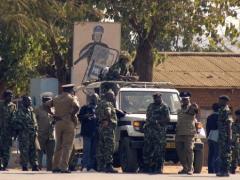BLANTYRE (AFP) – Shops, restaurants and banks across Malawi shut their doors Wednesday at the start of a three-day stayaway called by civic groups demanding political and economic reforms from President Bingu wa Mutharika.
In the commercial hub Blantyre, the capital Lilongwe and the northern town of Mzuzu, streets were largely empty as residents stayed home — many saying they feared a repeat of rioting in July when police shot dead 19 people.
Police were out in force as the government broadcast messages on television and radio, and even through loudspeakers on the streets, trying in vain to encourage people to return to work.
Mutharika himself toured a deserted market in Blantyre, blasting the stayaway as an illegal strike and demanding that people return to work on Thursday.
“The civil society’s call for all not to work for three days is absurd. It is incitement to an illegal national strike,” he said. “I expect everyone to come to their offices and businesses.”
Despite the heavy police presence, few shopkeepers were willing to open.
“I have completely closed today despite being assured by the police presence,” said Richard Mindowi, who operates a restaurant in Ndirande township in Blantyre.
“You cannot be sure in Malawi when violence can break out, because many people here want to take advantage of strikes,” he said.
Moses Mkandawire, a key organiser of the stayaway, said the call for workers to stay at home was “the best option as a quiet protest” to add pressure on Mutharika.
“We didn’t want to lose property and life as happened on July 20,” Mkandawire added.
The Human Rights Consultative Committee, a broad coalition of civic groups, called for anti-government protests on July 20. When a court banned the protests, clashes broke out with police who used live fire to break up crowds.
The activists had originally planned to hold nationwide vigils on Wednesday, but when police declined to issue permits the organisers called for a three-day stayaway instead.
They accuse Mutharika of mismanaging the economy of Malawi, which is battling shortages of fuel, electricity and foreign currency.
They also accuse him of centralising power in his office at the expense of Malawi’s democratic gains since the fall of dictator Kamuzu Banda in 1994.
Mutharika has already bowed to some demands by creating a new, smaller cabinet. But his ministers now include his wife and his brother, who is widely seen as his possible successor.
The activists want Mutharika to do more to rein in government spending in the impoverished nation, starting with selling a $13 million presidential jet purchased by his government.
They also want a ban on the import of luxury cars for government officials, a review of the policy on fuel imports, and mended ties with key donors who have cut aid over worries about Mutharika’s governance.
Police around the country said the stayaway unfolded smoothly. Government ministries in Lilongwe opened as usual, but one civil servant said the city felt like it was on holiday with few cars on the streets.
“Most banks have not opened and life is moving at a small pace here,” he said, speaking on condition of anonymity.
Police officers, the majority unarmed, moved in groups of three to four along near-deserted streets in Blantyre where the bulk of shops as well as banks were closed.
Similar scenes were reported in the small northern city of Mzuzu.
“It’s a normal day here apart from the empty streets and the banks and shops not opening,” police spokesman Edward Longwe said.


No comments! Be the first commenter?